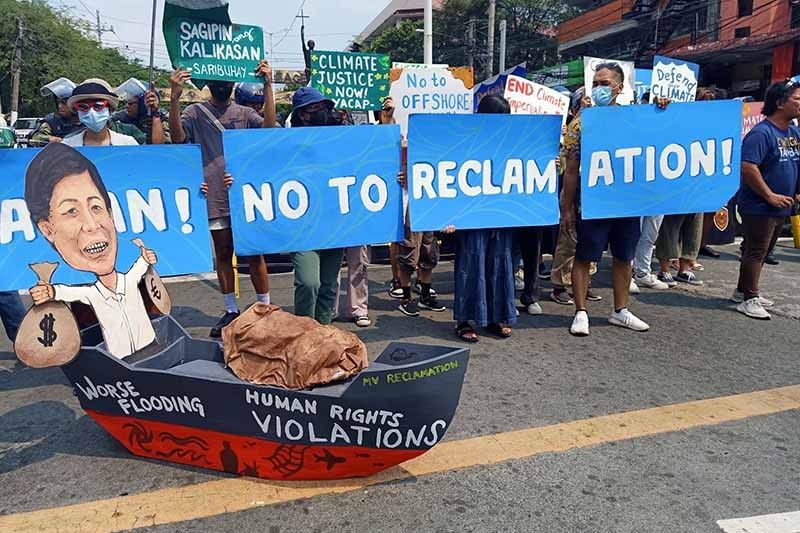MARCOS RALLIES PINOYS IN U.S.; 5 INITIAL DEALS SIGNED; Meeting with Biden, Xi, other leaders; going to LA, Hawaii
By ALFRED GABOT and CLAIRE MORALES TRUE
Editor in Chief and Managing Editor
SAN FRANCISCO – For the third time since taking over Malacanang on June 30, 2022, President Ferdinand R. Marcos Jr. is in the United States, this time meeting with US President Joe Biden and leaders of 21 member nations of the Asia Pacific Economic Cooperation (APEC) in a two-day summit and related and business meetings at the Moscone Convention Center in San Francisco and elsewhere.
Marcos said that his third visit to the US was upon the invitation of President Biden who he first met on the sidelines of the United Nations General Assembly session in New York and later in the White House. Vice President Kamala Harris, a native of San Francisco Bay Area, and a recent visitor in Manila and Palawan, also invited Marcos for talks.
As soon as he landed on a chartered Philippine Air Lines flight at the San Francisco International Airport, Marcos started his activities with a meeting with the Filipino American community from various groups at the South San Francisco Convention Center near the airport where he thanked them for their big support to the Marcos-Duterte team in the last election and contribution to the country through sizable remittances and commended them for their achievements in the US. Among the achievers he singled out were California Attorney General Rob Bonta and Utah Attorney General Sean Reyes.
Philippine Consul General Neil Frank Ferrer led in welcoming the President, First Lady Louise Lisa Marcos, Speaker Martin Romualdez and Cabinet members including Foreign Affairs Secretary Enrique Manalo, Trade and Industry Secretary Alfredo Pascual, Economic and Planning Secretary Arsenio Balisacan, Public Works and Highways Secretary Manuel Bonoan, Information and Communications Technology Secretary Ivan John Uy, Finance Secretary Benjamin Diokno, Tourism Secretary Christina Frasco, Budget Secretary Amenah Pangandaman, Presidential Assistant Antonio Lagdameo and Transportation Secretary Jaime Bautista.
The Marcos delegation also Rep. Ralph Recto, Bangko Sentral ng Pilipinas Governor Eli M. Remolona Jr., presidential sister Irene Marcos Araneta, PAGCOR chief Al Tengco and others.
Filipino singers Jaya (Ma. Luisa Ramsey), Jay R (Gaudencio Sillona III in real life), and Florante (Florante de Leon) led the personalities who provided entertainment during the program, some of whose attendees came from as far as Alaska, Washington, Oregon, Nevada and Los Angeles and San Diego in southern California.
The President also congratulated the frontline workers who showed patriotism during the COVID-19 pandemic and acknowledged the achievements of young Filipino Americans, such as Sarina Bolden’s goal in the 2023 FIFA Women’s World Cup, and the increasing participation of Filipino Americans in the Bay Area and Silicon Valley that supports the rapid growth of the Philippines.
Marcos also hailed Filipinos and Filipino-Americans in the United States for their success as well as contributions both to the Philippines and their host country. He also recognized Filipinos who won statewide elective positions in the US, including South San Francisco Mayor Buenaflor Nicolas.
“Mula noon hanggang ngayon, pinatutunayan ninyo na kayo ang mga bagong bayani ng ating salinlahi. Kaya naman sa Bagong Pilipinas na ating itinataguyod, nais ng inyong pamahalaan na suklian ang inyong pagsusumikap upang bigyan ng mas magandang bukas ang ating mga anak,” he said of the Filipinos in the US.
During the COVID-19 pandemic, Americans experienced first-hand the Filipino way of caring and acting on the needs of others, said Marcos, stressing that one in every five nurses in California are trained in the Philippines, with Filipino nurses, doctors, first responders, and essential workers all demonstrating the timeless Filipino virtues of malasakit, pakikipagkapwa, and bayanihan.
“We are all grateful for your selfless service to humanity, and we look up to you as role models for future generations of Filipinos and Filipino Americans,” he said.
“We recognize the hard work of Overseas Filipinos in the US. In 2022, the workers, health workers, injected [US$] 14.89 billion to the Philippine economy in cash remittances—making the United States the Philippines’ biggest single source of remittances.”
According to the President, he is honored to follow the footsteps of his late father, President Ferdinand Edralin Marcos Sr., who first visited San Francisco in 1966 during his first year in office.
Considering San Francisco as an important city because of the significant Filipino population, the Philippine government in 1974 purchased a set of buildings off Union Square in the downtown area, which is now known as the Philippine Center in San Francisco, the President said.
There are now more than four million Filipinos and Filipino Americans in the US, of which 1.3 million reside in the 10 states under the jurisdiction of the Philippine Consulate General in San Francisco and 700,000 in the Bay Area.
Later, Marcos reaffirmed the country’s commitment to attracting more investments through fiscal incentives and a business-friendly environment during a roundtable discussion with business leaders.
Immediately on the sidelines of President Marcos participation the APEC Summit, the Philippines and the United States signed at least five agreements on clean energy, health care, pharmaceutical production, Internet connectivity, and climate technology.
“It is a good experience always to come and officiate, or shall we say, witness the agreements that we have come with our partners, some government-to-government and some on the private sector,” Marcos said after the signing of deals at the Ritz Carlton Hotel in San Francisco.
“They all hold a great potential for the Philippines to reshape its landscape of clean energy, health care, pharmaceutical manufacturing, Internet and satellite technology, and climate technology,” he said.
Marcos also addressed the APEC CEO Summit, urging members must address “negative” externalities to make their economies “resilient and sustainable.”
Marcos said the economic model and international trading system that heightened economic growth in the Asia-Pacific region “are now getting undermined by criticisms due to apparent and exacerbating gaps.”
“Strengthening the system that has led to our cooperation and development must entail addressing the core issues and areas for improvement which are – from the perspective of the Philippines and most if not all of our economies – distributing wealth and welfare effects more effectively and equitably, and ensuring that our economies develop in a manner that is resilient, sustainable, and mitigates negative externalities,” Marcos said.
“These are of paramount importance because we can only be as strong as the weakest members of our economies, of our societies. Regardless of how much progress we make in these halls, if such does not translate to a better quality of life and resiliency, we will remain derailed by even the most subtle of shocks and insecurities that are beyond our control,” he added.
According to Malacanang reports, the Manila Electric Co. (Meralco) and the Ultra Safe Nuclear Cooperation (USNC) signed a cooperation agreement to undertake a Pre-Feasibility Study on Micro-Modular Reactors (MMRs) to explore clean and sustainable energy options in the country.
Under the agreement, a feasibility study will be conducted for the potential deployment of MMRs in Meralco sites aimed at enforcing the sustainable energy agenda and providing affordable and dependable access to power, particularly to the underserved and off-grid areas, for economic empowerment.
The study would enable Meralco to obtain an estimate of the environmental and social impact, capital expenditure, and operational costs, among others, related to the siting, construction, and operation of one or more MMR energy systems in the Philippines.
The partnership between Meralco and USNC is a “significant step” towards exploring clean and sustainable energy options for the Philippines, Marcos said, adding that it is aligned with the government’s commitment to reduce greenhouse gas emissions and increase resilience to climate change.
Ayala Group’s AC Health also signed a cooperation agreement with US-based Varian Medical Systems to improve access to quality cancer care in the Philippines by sharing their expertise in establishing and running the Philippines’ first dedicated specialty oncology hospital.
The partnership will enable AC Health to establish the Healthway Cancer Care Hospital in the Philippines, which will serve as a network of oncology clinics throughout Metro Manila aimed at providing cancer patients access to comprehensive cancer care using Varian’s state-of-the-art and multi-modality cancer care technologies.
Among the signatories were Jaime Augusto Zobel de Ayala of the Ayala Corp., AC Health chief executive officer (CEO) and president Paolo Borromeo, Varian Philippines president and managing director Heinz-Michael Horst Schmermer, and Varian’s Advanced Oncology Solutions vice president Chuck Lindley.
Marcos said the collaboration between AC Health and Varian Medical Systems is a vital stride in the fight against cancer and reflects the Philippines’ growing potential as a “leading health care destination in Asia.”
In 2023, cancer is the third leading cause of death in the Philippines, with about 141,021 new cancer cases and 86,337 cancer deaths every year.
To boost cancer control efforts and reduce the burden of the disease, the Philippines enacted Republic Act 11215, or the National Integrated Cancer Control Act, in February 2019. As of this month, the Department of Health is set to establish 16 Cancer Care Specialty Centers nationwide.
Meanwhile, the Philippine company Lloyd Laboratories and US firm DifGen Pharmaceutic signed a joint venture agreement worth USD20 million to boost the local production of medicines in the Philippines.
The joint venture will cover mutual interest in collaborating on the filing of an Abbreviated New Drug Application (ANDA) and the marketing of jointly developed pharmaceutical products within the US.
An investment of up to US$20 million will be undertaken by Lloyd Laboratories for the establishment and operation of the first US Food and Drug Administration’s approved manufacturing facility in the Philippines, contributing to the advancement of the country’s position as a key player in the global pharmaceutical industry.
The signatories for Lloyd Laboratories were Dr. Lloyd Balajada, Christopher Bamba, and lawyer Rafael Calinisan, while lawyer Oliver Baclay and Ramandeep Singh Jaj signed for DifGen Pharmaceuticals.
Marcos said the joint venture between Lloyd Laboratories and DifGen Pharmaceuticals is vital in expanding the country’s local production and promoting a competitive and robust local pharmaceutical industry.
An agreement between the Philippines’ satellite service provider Orbits and California-based communications satellites operator Astranis for the deployment of the first two Internet satellites to improve connectivity in remote areas in the Philippines was also signed.
The agreement is expected to generate US$400 million worth of investment over the next eight years through the MicroGEO satellites, which will provide Internet service in the unserved and underserved areas of the Philippines, covering up to 10 million users and 30,000 villages.
It is also projected to create more than 10,000 jobs for direct and indirect employees and partners.
During the event, Philippine Ambassador to the US Jose Manuel Romualdez announced the official name of the first satellite as “Agila” to foster the spirit of technological advancements and strengthen international partnerships.
The selection of the name Agila, he said, holds deep significance, embodying the project’s unwavering commitment to connecting and empowering the Filipino nation through the expansion of access to the digital world.
Marcos said the partnership between Astranis and Orbit would help bridge the digital divide and foster digital transformation in the Philippines.
Leading artificial intelligence (AI) meteorology company Atmo, Inc. also signed a memorandum of agreement with the Department of Science and Technology (DOST) for the establishment of a high-resolution weather forecasting system for the Philippines using AI technology.
The MOA was signed by DOST Undersecretary Maridon Sahagun and Atmo founder and CEO Alexander Levy.
It will be Asia’s largest AI-driven weather forecasting program, which is expected to play a pivotal role in bolstering the Philippines’ resilience.
The MOA on weather forecasting will benefit the Philippines, considering that it is one of the countries most affected by typhoons.
Marcos welcomed the signing of the agreement, saying it would help make the country climate-resilient.
“The Philippines is one of the countries most affected by typhoons, with an annual average of 20 typhoons that bring heavy flooding and cause billions of pesos in damage to infrastructure, to agriculture, and to people’s lives. Atmo and the Department of Science and Technology’s partnership on an AI-powered weather forecasting system will help the Philippines build its climate resilience,” he said.
Based on records, the Philippines experienced 17 typhoons from July 2022 to May 20
Marcos is in San Francisco for a weeklong participation at the Asia-Pacific Economic Cooperation (APEC) and visits to Hawaii and Los Angeles.
He will be in California until Nov. 17 to raise issues on clean energy, innovation, and digitalization. His visit to Hawaii and Los Angeles state are scheduled on Nov. 18 to 19.
Marcos said that he will meet with business leaders of the Asia-Pacific region to discuss food and energy security, and economic inclusion of the Philippines’ micro, small, and medium enterprises (MSMEs), women, and indigenous people, among other segments of the economy.
The chief executive is also expected to deliver the keynote remarks on “intentional equity in sustainability” at the APEC CEO Summit, which he deemed is the annual gathering of top CEOs from across the APEC region
Marcos said he is looking forward to the signing of government-to-government, public-private, and business agreements, which have been under negotiation over the past several months.













